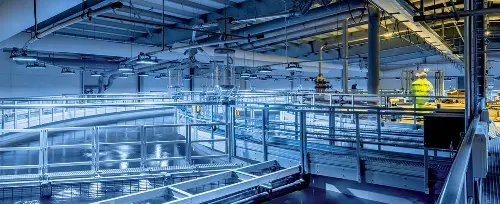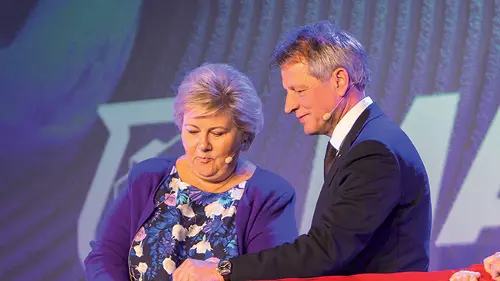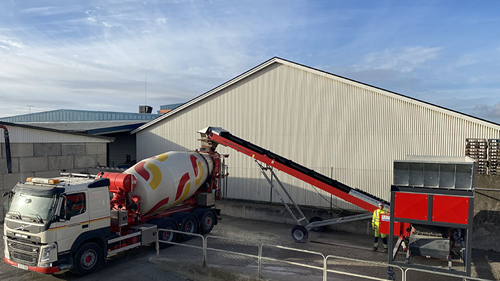Thanks to its partnership with the logistics company Ruuds Transport, the Group's Norwegian subsidiary leads the way in northern Europe for the sustainable delivery of its materials with electric trucks.
As a “pillar” of the company's corporate philosophy, sustainability is a far-reaching concept for Mapei: it involves not only the formulation and manufacture of materials but also the facilities in which it operates and the suppliers it chooses. And it is, indeed, this final link in the chain that Mapei AS, the Group's Norwegian subsidiary, has recently focused on to ensure its customers receive deliveries that do not use fossil energy sources and, as a result, have much lower environmental impact than conventional means of transport.
This has been achieved with the help of Ruuds Transport, a logistics company which, for a long time now, has used 36 diesel trucks for transporting Mapei materials. Since the autumn of 2021, Ruuds Transport and Mapei AS have started to assess the possibility of using electric vehicles over even much greater distances, bearing in mind the increasing market focus on sustainability.

Mapei AS has started delivering its products to Norwegian customers using electric trucks
Early this summer, Ruuds Transport was supplied with its first electric trucks by the manufacturer Scania, a key partner in this project. These trucks are fitted with a new type of electric battery with a capacity of 624 kWh. This is a ‘third generation’ battery that enables the trucks to transport loads of 50-60 tonnes for 30-40 km without needing to be recharged. “We had decided to wait for this new generation battery to be sure our trucks can cover the necessary distances efficiently”, so Knut Ruud told us, managing director of Ruuds Transport.
In the meantime, the Norwegian transport company had taken care of setting up loading and unloading platforms as well as eleven charging points for the new vehicles, six of them in its own facility and two at the Mapei AS plant in North Odal. In addition, Ruuds Transport can rely on various charging devices located right across the Norwegian road network.
“Thanks to this network of charging points we will also be able to guarantee efficient transport when we purchase any new electric trucks. In addition to the truck we have already purchased, we have now ordered three more which will be delivered before the end of the year,” so Knut Ruud added.
Road test to the world's northernmost city passed with flying colours
In order to test the efficiency and reliability over long distances of the network of charging points on Norwegian roads and Scania's new electric trucks, Knut Ruud of Ruuds Transport decided to take a test drive, while at the same time carrying out an order for one of Mapei AS’ customer.
The Scania 45 S 6x2*4 electric truck carried a batch of chemical products for the building industry on its main body and load of cement in a container for a total weight of 47.5 tonnes.
It travelled 1830 km from Mapei AS's Sagstua plant in Nord Odal in southern Norway to its customer, Ølen Betong, in Alta, which is known as “the northernmost city in the world”.
To begin with, the most suitable route was selected taking into account the characteristics of the vehicle, the roads and the presence of charging points. Passing through Sweden would perhaps have been the easiest and quickest route, but Knut Ruud chose to take the Norwegian roads: "It was primarily an opportunity to test the vehicle’s performance but also to practise using the charging devices along the way and test both the battery charging efficiency and accessibility of the trucks."

The first long-distance travel of Ruud Trasnport electric truck for Mapei also tested the network of electric charging points along the Norwegian roads.
The journey was accordingly divided into 200 km stretches between recharging operations. And everything went even better than planned.
“Our expectations were exceeded. The truck worked properly and the results were as expected or even better. For example, we proved that this kind of vehicles can even handle journeys covering distances of over 300 km which is the standard length of regional deliveries” so Knut Ruud announced upon reaching Alta.
The biggest challenge was the recharging of the batteries: apart from the fact that the charging stations are primarily designed for cars and not trucks, it must be borne in mind that Scania's electric trucks need up to 375 kWh before the battery is fully recharged. In addition, we are dealing with charging systems that are very different in terms of efficiency and ease of usage; systems requiring the use of different apps.
In any case, as Knut Ruud stated, the trip proved that “it is entirely possible and even comfortable to cross Norway in an electric truck”.

The new electric truck was tested on a 1830 km trip from Mapei AS's Sagstua plant in Nord Odal in southern Norway to its Ølen betong in Alta, the northernmost city in the world.
An increasingly sustainable building industry
“Today is a special day for Mapei,” so Trond Hagerud noted, CEO of Mapei AS. “Our goal is to reduce the environmental impact of our operations and products as much as possible: reducing the carbon footprint of the logistics system we use is an important part of this project.”
Thanks to this initiative and the partnership with Scania and Ruud Transport, Mapei AS is now also able to guarantee fossil-fuel-free deliveries of its products to Norwegian building sites, which, in turn, are now investing heavily in sustainability and aspiring to be completely fossil-free. Both Mapei and Ruud Transport have, in fact, seen the demand for increasingly sustainable products and services grow among their business partners: guaranteeing logistics services with reduced environmental impact undoubtedly gives them a competitive edge and is further proof of Mapei's determination to invest in all-round sustainability.
By the end of the year, there will be four battery-electric trucks from Ruud Transport dedicated to transporting Mapei materials, but both sides also hope this number will rise very soon.















